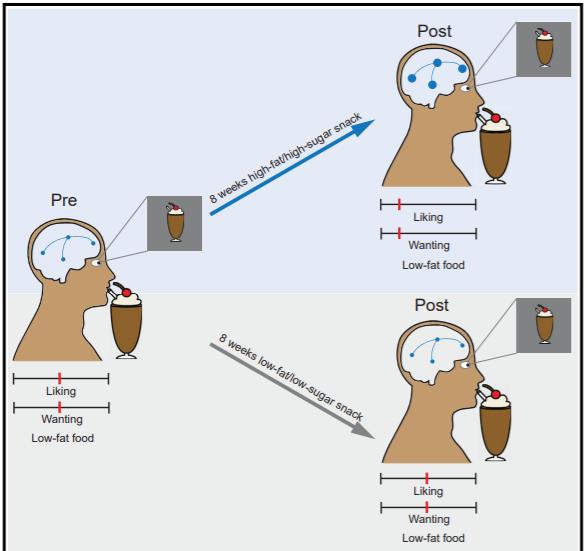▎WuXi AppTec content team editor
Every time I visit the supermarket, potato chips, chocolate and other foods always attract the attention of many people, even if there is an overwhelming low-sugar and low-fat healthy eating promotion, but the status of these foods in the heart is always difficult to replace.
But why do we have to eat these foods? Recently, the Yale team published a paper in "Cell-Metabolism", showing that high-fat, high-sugar foods will subtly reshape the human brain, even if consumed in small daily doses, the brain will be more inclined to obtain energy from these foods in the future.
This process is actually a natural evolutionary strategy for all organisms to find energy, no matter which foods enter the digestive system, the nutritional value of food cues will be transmitted to the central nervous system, such as intestinal cells feel fat at the same time, the vagus nerve will send signals to the brain, regulate dopamine function, to cause excitation drive.
And the brain in contact with a large amount of glucose will produce an immediate response much higher than normal, this violent response will even shape the brain's sensory association learning process, if the intake of high sugar while we always see the "donuts" sign, then over time the doughnut becomes a high-calorie prompt code, even if not hungry This connection will be close.
In the study, the authors set such a "doughnut" trap for volunteers. In addition to the normal daily diet, some volunteers will eat an extra pudding dessert containing a lot of fat and sugar, while others will eat the same total calories of the pudding, but the fat content is significantly lower.

▲Volunteers who regularly eat high-fat pudding will become more partial to high-fat foods (Image source: Reference [1])
In addition, different volunteers also drank apple juice with different sucrose concentrations. According to the volunteers' reports, they were able to detect different concentrations of fat and sucrose, and their sense of taste did not fail due to the increase of the two molecules.
However, volunteers who consumed high-fat pudding for a long time seemed to be more inclined to choose high-fat foods in subsequent foraging. Similarly, after drinking high sucrose juice, it will unconsciously reject low sucrose juice.
Obviously, this habit is not a problem with the sense of taste. According to their tests of the volunteers' brain activity, high-fat foods directly altered brain neural responses, such as high-fat foods can activate neural circuits in the midbrain and prefrontal cortex for food prediction, which can enhance the production of excitation drivers and make people more want to choose high-fat foods.
Image source: 123RF
More critically, high-fat, high-sugar diets can also significantly affect the dopaminergic system, such as long-term consumption of high-fat diets can reduce dopamine reuptake, or downregulate dopamine receptors. Brief exposure of the brain to a high-fat diet can significantly enhance the excitation transmission of dopamine neurons. These changes all increase an individual's motivational drive for high-fat foods, i.e., prefer to eat these foods because they do make people happy.
"The brain creates new connections when it eats foods like potato chips, which causes the brain to subconsciously prefer these foods," said Dr. Marc Tittgemeyer, the corresponding author of the study, who estimated that after the experiment, volunteers would continue to prefer high-fat, high-sugar foods, "because once the brain forms a connection, it doesn't disappear so quickly." ”
Resources:
[1] Dana M. Small, Habitual daily intake of a sweet and fatty snack modulates reward processing in humans, Cell Metabolism (2023). DOI: 10.1016/j.cmet.2023.02.015.
[2] Sweets change our brain: Why we can't keep our hands off chocolate. Retrieved March 24, 2023 from https://medicalxpress.com/news/2023-03-sweets-brain-chocolate.html